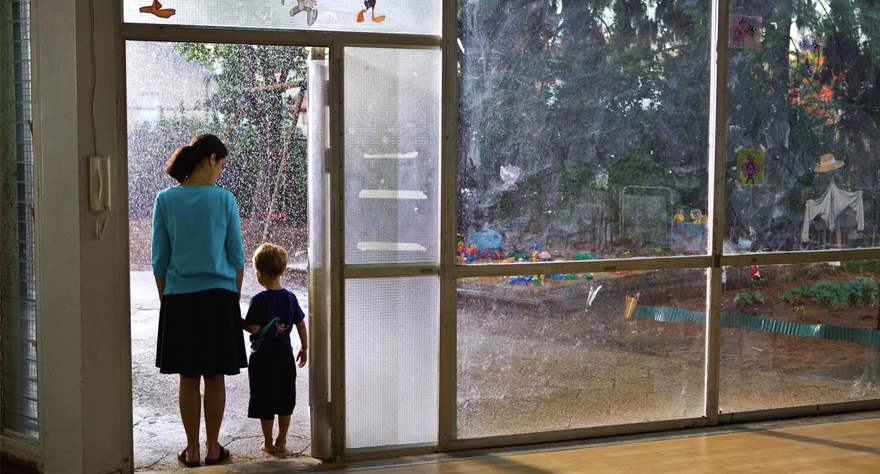
A child prodigy and his obsessive teacher make for a hauntingly evocative but ambiguous tale.

A child prodigy and his obsessive teacher make for a hauntingly evocative but ambiguous tale.
Poetry and its personal process are notoriously difficult topics to portray with accuracy, but The Kindergarten Teacher bypasses the burden, hinging its story instead on the mystery of a child’s inexplicable artistic gift. We first meet the five-year-old prodigy (Avi Shnaidman) in the schoolyard, where he paces, dictating a new poem to his nanny. His name is Yoav, and his expression is deadly serious in this moment, eyes lost in a world of words that only he can see materializing. His teacher, Nira (Sarit Larry), looks on from a doorway nearby. She can’t believe what she’s hearing. Such unblemished beauty is hard to come by in her daily life and to see it pour from the mouth of someone so naïve and easily influenced spurs in her the immediate instinct to foster and protect that talent.
Yoav is a quiet boy who does not quite understand the occasional pangs of inspiration, himself. He does not reflect on the words or linger on their meaning. His nanny treats the poetry as nothing more than a pretty novelty and his father disregards it altogether, harshly discouraging the practice when Nira brings it up. So what is one to do when something so miraculous arises and the world writes off its importance?
As the title might suggest, The Kindergarten Teacher is more focused on Nira than Yoav and it is the study of her character that is most engaging. Nira’s home life is not strenuous, but she is visibly unenthused by the mundanities surrounding her (a loving, but oblivious game show-watching husband and a “married to the military” son among them). In her spare time, she attempts writing poetry, herself, regularly attending a club where we learn that, despite her good intentions, she is not exactly a saint.
Nira passes off Yoav’s work as her own at the weekly gathering, partially using it to advance a relationship with the group’s moderator, and it is around this point that her character begins to develop some creepy tendencies. She obsesses over Yoav and his gift; stalking, calling him at home, manipulating his father and waking him up from daily naps in an effort to spark some creative fire and squeeze some buried wisdom from him. Her behavior is disturbing at times, and while it is interesting to watch this desperation progress, the film constantly calls into question the ethics of a character that we’re seemingly meant to empathize with. The complexity is good, but the messages are understandably mixed. The lack of context behind Nira’s motivation only perplexes further.
Such emotional and conceptual imprecision is all the more disappointing considering that The Kindergarten Teacher concerns itself so heavily with undertones and ideas. It is a film that is vaguely about critiquing society (targeting the cheap things they values and the beauty they malign), but also about the reckless preservation and cultivation of things that society has collectively moved away from. Intermingled with this is the curious problem of the enigmatic Yoav. Where does his poetry come from? How does he reach depths of truth that writers much older and wiser than him have struggled to internalize? The audience is gently teased with the notion of him repeating words others have spoken—is this merely a game to him? Are we overestimating the situation? All of these issues tread lightly and because of this, the quietly growing story is perpetually interesting. Always seemingly on the verge of a revelation, some great qualifier just around every corner.
Nadav Lapid’s direction plays a substantial role in making that sense of intrigue stick. Primarily, it’s his use of the camera. Negative space in framing is hauntingly evocative, fluid pans are favored over hard cuts, and tricks with focus serve to subtly suggest the world surrounding what is immediately in sight. Additionally, he’s made a funny choice in allowing the camera to exist with the film. From the first shot, the audience is made aware of its presence, as a character bumps into it twice. The same phenomenon repeats later on and from time to time, characters will peer directly into it. These aren’t point-of-view shots from an invisible character, and Lapid’s reasoning for this tactic isn’t always clear, but it affords the audience an almost uncomfortably close involvement with the events and lends the film a self-awareness that is highly fascinating.
Sadly, The Kindergarten Teacher’s great downfall lies in its inability to translate its mystery and conceptual ambitions into something productive and satisfying. The ideas fail to cohere. That great revelation waiting around the corner never arrives. The slow burn of the story peters out and grinds to a halt with a flat anticlimax that frustrates more than it provokes thought. After two hours, Lapid’s initially tantalizing ambiguity wears thin and with nothing to show for it by the end, the result is a film that is far too oblique for its own good.
It’s hard not to have mixed feelings. Here is a work that is formally arresting and narratively gripping (but only on the basis of what it obscures). A film that takes the effort to dirty up its well-meaning protagonist but confuses its intentions in the process. It’s interesting until it isn’t anymore and appears profound without actually possessing the substance to prove it. Sometimes too much subtlety is a bad thing, and while The Kindergarten Teacher boasts plenty of striking visuals and thoughtful flourishes, the film’s apparent hollowness is hard to get past.